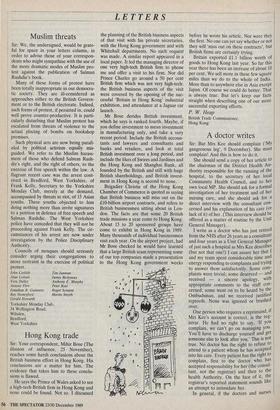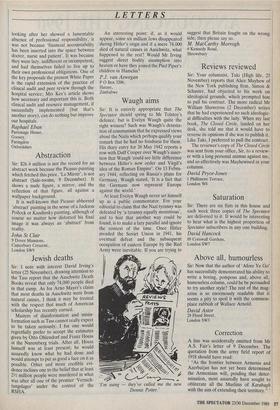A doctor writes
Sir: But Mrs Kee should complain My gangrenous leg', 9 December). She must complain! And this is how to do it. She should send a copy of her article to the chairman of the District Health Au- thority responsible for the running of the hospital, to the secretary of her local Community Health Council, and to her own local MP. She should ask for a formal investigation of her treatment and of her nursing care, and she should ask for a direct interview with the consultant con- cerned and his explanation of his care (or lack of it) of her. (This interview should be offered as a matter of routine by the Unit General Manager). I write as a doctor who has just retired from the NHS after 26 years as a consultant and four years as a Unit General Manager of just such a hospital as Mrs Kee describes (but not that one!) I can assure her that I and my team spent considerable time and energy responding to complaints and trying to answer them satisfactorily. Some com- plaints were trivial; some deserved — and received — a sincere apology, with appropriate comments to the staff con- cerned; some went on to be heard by the Ombudsman, and we received justified reproofs. None was ignored or brushed over.
One person who requires a reprimand, if Mrs Kee's account is correct, is the reg- istrar. He had no right to say, 'If you complain, we can't go on managing you. You'll have to discharge yourself and get someone else to look after you.' This is not true. No doctor has the right to refuse to attend to a patient whom he has accepted into his care. Every patient has the right to complain, first to the doctor who has accepted responsibility for her (the consul- tant, not the registrar) and then to the health Authority. On the face of it, the registrar's reported statement sounds like an attempt to intimidate her. In general, if the doctors and nurses
LETTERS
looking after her showed a lamentable absence of professional responsibility, it was not because 'financial accountability has been inserted into the space between doctor, nurse and patient'. It was because they were lazy, indifferent or incompetent, and had themselves failed to live up to their own professional obligations. One of the key proposals the present White Paper is the rapid extension of the practice of clinical audit and peer review through the hospital service; Mrs Kee's article shows how necessary and important this is. Both clinical audit and resource management, if successfully implemented (but that's another story), can do nothing but improve our hospitals.
Raphael Eban
Parsonage House, Goosey, Faringdon Oxfordshire











































































































 Previous page
Previous page